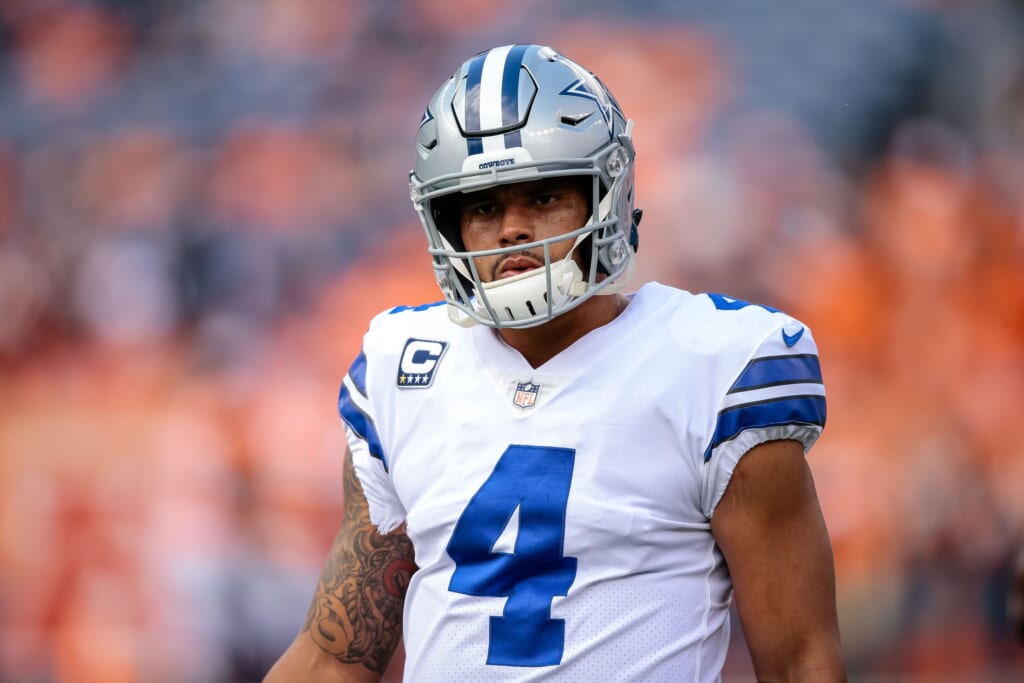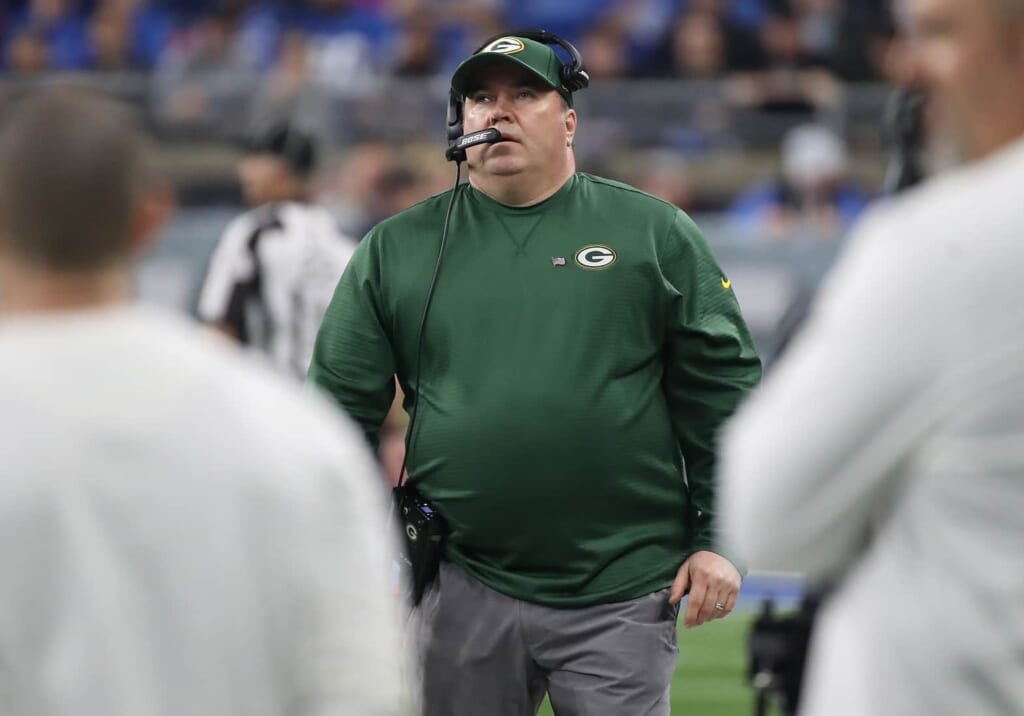
The NFL is back. Week 1 gave us a number of great performances to talk about. It also gave us plenty of notable blunders.
Sunday night’s game between the Chicago Bears and Green Bay Packers featured two of the league’s very best players playing incredible football. It also featured a massive mistake from each team, one from a coach, and the other from a player.
Of course, that game was not the only one to feature a coaching mistake. Dallas Cowboys coach Jason Garrett and Atlanta Falcons offensive coordinator Steve Sarkisian went into their respective games with highly suspect plans. Meanwhile, Seattle Seahawks coach Pete Carroll let a massive opportunity go by the wayside, creating a massive early swing in his game against the Denver Broncos.
Things were rough on the player’s side of the fence, as well. Los Angeles Chargers punt returner J.J. Jones may not have cost his team a win. But a terrible blunder sure cost the Bolts a chance. New York Giants tackle Ereck Flowers appeared to just be overwhelmed in his matchup with Jacksonville Jaguars’ star Calais Campbell. But his explanation made for one of the most baffling blunders we’ve seen in a while.
These were the most notable and embarrassing blunders from NFL Week 1.
Kyle Fuller lets win slip out of his hands
There’s no questioning the greatness of Aaron Rodgers. His comeback on Sunday night was just another incredible achievement for one of the greatest players in NFL history. From the Chicago side, we also must say that one player didn’t lose the game. After a dominant first half, the Bears went cold on both sides of the ball in the second.
With all of that being said, it’s hard to escape this: If Kyle Fuller had held on to a gimmie interception, Chicago would have won this game. He did not. Two plays later, Randall Cobb was in the end zone, scoring the winning touchdown in Sunday night’s classic.
In dropping the ball, Fuller learned a painful lesson. You just can’t give a player like Rodgers a second chance. When you do, prepare for the worst, because it’s inevitable.
Pete Carroll botches challenge
While Seattle’s 27-24 loss to the Denver Broncos wasn’t decided until the final seconds of the game, arguably the most important sequence happened in the first quarter. With the Seahawks up 7-0, the Broncos embarked on a drive that tied the game.
During that drive, Denver running back Royce Freeman fumbled the ball, only he was ruled down. Carroll tried to challenge but the Broncos got to the line quickly and snapped the ball. Now, the referees should have gotten the call right to begin with. A case could even be made that Carroll got the challenge flag out before the ball was snapped. But it should never have been that close. Heck, if nothing else, Carroll could have taken a quick time out to review the play more. In the first half, coaches can be a little more liberal with timeout usage.
The play not being challenged allowed Denver to score. Not only that, but the fumble would have given Seattle the ball at around midfield, giving the Seahawks a chance to go up 10-0, or even 14-0. Carroll may not be the only man to blame for this blunder. But he’s a veteran coach and cut a very important play way too close. He does deserve the blame for that.
Myles Garrett block keeps Browns from win column?
Garrett was called for a crucial penalty that the NFL has since acknowledged that this was not the right call. But another penalty that Garrett was called for proved costly in the Cleveland Browns’ losing-streak-ending tie to the Pittsburgh Steelers.
Joe Schobert recovered a fumble late in overtime and returned it inside of the Pittsburgh 10. On the return, Garrett was flagged for an illegal block in the back on Maurkice Pouncey. Sometimes penalties spring big plays. That did not happen here. Schobert was already nearly out of bounds. Additionally, Garrett actually blocked Pouncey into Schobert.
The penalty meant that Zane Gonzalez had to try a 43-yard field goal instead of one from 28 (or even shorter). We don’t know that it would have made a difference. T.J. Watt might have blocked it anyway. But we do know that a 28-yard field goal has a much different feeling than a 43-yarder. Even though the tie against the Steelers gave the Browns their best start in more than a decade, we can’t blame anyone in Cleveland for wondering what might have happened if that block never took place.
Ereck Flowers apparently doesn’t know who he’s going up against
We knew that Flowers didn’t watch up well with Calais Campbell. That’s a mismatch, not a blunder. What we learned after the game put it into a different perspective.
On the first play of the game, Jacksonville’s veteran pass-rusher beat Flowers on the inside. On Monday, Flowers stated that he didn’t know what kind of pass rusher Campbell was. So, on the game’s first play, he was expecting one thing from Campbell and got the exact opposite.
How does this happen? Campbell is 32 and is in his 11th season as a pro. Additionally, this is the first week of the season. Flowers (and the Giants) had plenty of film and literally weeks (if not months) to look it over. Heck, Flowers and Campbell even went to the same college. There is no possible excuse for this blunder.
Cowboys rely too much on Dak Prescott

While not as bad as what we saw in Miami, Carolina got plenty of bad weather on Sunday. Playing on a sloppy field against a tough defense on the road, a heavy dose of Ezekiel Elliott seemed like a prudent idea. If only offensive coordinator Scott Linehan agreed.
While Elliott ran for 4.6 yards a carry, he got only 15 carries. Meanwhile, Dak Prescott threw 29 passes, was sacked six times, and scrambled five other times. So, Garrett had him drop back 40 times. In other words, the Cowboys were prepared to rely on Prescott nearly three times as often as Elliott.
The Carolina Panthers were far from overwhelming on Sunday, scoring only 16 points. But given the play calling from Dallas, that was more than enough.
Jack Doyle fumbles away scoring opportunity
The Indianapolis Colts were deep in Cincinnati Bengals and driving for the winning touchdown. Facing a third-and-15, Andrew Luck found Doyle. It appeared as though the Colts’ tight end would be brought down just short of the marker, giving Indianapolis a manageable fourth down.
Only, Doyle could not hold onto the ball. Clayton Fejedelem’s hit jarred the ball loose. Then, for good measure, Fejedelem scooped the ball up and scored. In close games, blunders are spotlighted even more than usual. This was a big one from Doyle.
This was one of Sunday’s better, more exciting games. Not many people saw that one coming. It ended with a blunder. That was far more predictable.
J.J. Jones muffs Chargers’ comeback hopes away
Two early touchdowns (a punt return and a long reception) from Tyreek Hill gave the Kansas City Chiefs an early lead over Los Angeles on Sunday. But while the Chiefs maintained a lead throughout, the Chargers kept the game reasonably close. The Bolts closed it to 31-20 early in the fourth quarter. After a three-and-out on Kansas City’s ensuing possession, Los Angeles was really in business.
Then, things went awry. Jones muffed the punt. He did recover the fumble, but obviously didn’t secure the ball well enough. De’Anthony Thomas was the first man to make contact with Jones and the ball immediately came loose. Again. This time, the Chiefs recovered. Three plays later, Hill was in the end zone for his third touchdown and the game was effectively over.
It was a play for the blooper reel. We can’t definitively say that it cost the Chargers the game, but it sure cost them a chance.
Mike McCarthy digs Packers’ hole deeper at end of first half

Green Bay had no answer for the Chicago pass rush at the end of the first half of Sunday night’s game. Khalil Mack was imposing his will. Late in the first half and facing a third-and-19 deep in their own territory, it seemed like an obvious time for the Packers to just call a run play, punt the ball, and get back into the locker room down only 10-0.
That didn’t happen. Mike McCarthy dialed up a screen pass for DeShone Kizer. Only, the Bears completely wrecked the play. Kizer got rid of the ball, but threw it right into the hands of Mack, who went in for a pick-six, putting a stamp on a dominant first half.
Even McCarthy has acknowledged that this was a mistake. In the short term, it made the Aaron Rodgers comeback even greater. But from a big-picture perspective, the blunder only added to the feeling that Rodgers masks a lot of mistakes from his coach.
Two-play sequence burns Jimmy Garoppolo and 49ers
Going against one of the NFL’s best defenses, Garoppolo was not sharp against the Minnesota Vikings on Sunday. It contributed to his first loss as a pro. If we are going to find one sequence to circle, we needn’t look beyond what happened early in the third quarter.
Trailing 10-3, Garoppolo had a wide open Greg Kittle downfield on a second-and-eight. Had the two connected, Kittle might have scored. At the very least, it would have set the San Francisco 49ers up deep in Minnesota territory. But Garoppolo’s pass was slightly long. While Kittle still could have (and should have) caught it, he didn’t — it went right through his hands, instead. One play later, Garoppolo was picked by Mike Hughes, who cruised into the end zone. While the 49ers fought back to make it reasonably close, the pick-six stood as the game winner.
As is always the case with plays that happen with a lot of time remaining, we don’t know what would have happened if Garoppolo had connected with Kittle, or at least not thrown the interception. But it was certainly a big sequence in the game and one that Garoppolo would certainly like to have a mulligan on.
Steve Sarkisian’s abysmal play calling
Matt Ryan looked bad in a tough road environment. Despite that, the Falcons really should have beaten the Philadelphia Eagles on Thursday night. They didn’t. And Sarkisian’s play calling shoulders a good deal of the blame.
On the game’s opening drive, Atlanta left superstar receiver Julio Jones on the bench for two plays in the red zone. On the final drive, the Falcons locked in a little too much to Jones. This included a pass to the sideline on the game’s final play where Jones actually made a fantastic catch, but had virtually no chance of coming down in bounds.
Some of that’s execution, of course. But that’s one of the reasons why sideline routes have such little margin for error. Jones was unstoppable, but Sarkisian essentially gave Philadelphia defenders a chance to use the sideline as the 12th defender. We’d cut Sarkisian some slack, but Thursday’s blunder-filled game came after a season’s worth of them in 2017. This was not a good start.